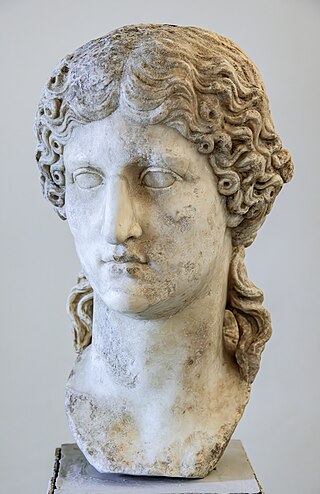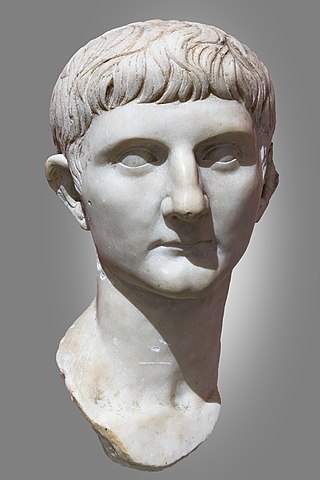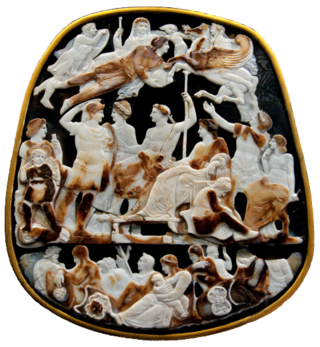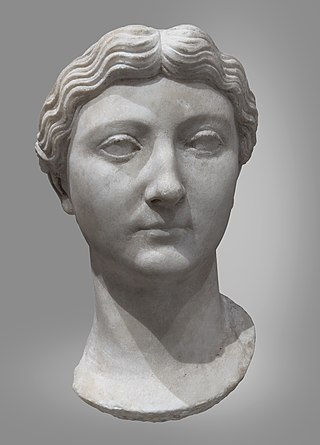
(Vipsania) Agrippina the Elder was a prominent member of the Julio-Claudian dynasty. She was the daughter of Marcus Vipsanius Agrippa and Augustus' daughter, Julia the Elder. Her brothers Lucius and Gaius Caesar were the adoptive sons of Augustus, and were his heirs until their deaths in AD 2 and 4, respectively. Following their deaths, her second cousin Germanicus was made the adoptive son of Tiberius, Augustus' stepson, as part of the succession scheme in the adoptions of AD 4. As a result of the adoption, Agrippina was wed to Germanicus in order to bring him closer to the Julian family.

Julia Agrippina, also referred to as Agrippina the Younger, was Roman empress from AD 49 to 54, the fourth wife and niece of emperor Claudius, and the mother of Nero.

Tiberius Claudius Caesar Augustus Germanicus was a Roman emperor, ruling from AD 41 to 54. A member of the Julio-Claudian dynasty, Claudius was born to Drusus and Antonia Minor at Lugdunum in Roman Gaul, where his father was stationed as a military legate. He was the first Roman emperor to be born outside Italy.

Germanicus Julius Caesar was an ancient Roman general and politician most famously known for his campaigns against Arminius in Germania. The son of Nero Claudius Drusus and Antonia the Younger, Germanicus was born into an influential branch of the patrician gens Claudia. The agnomen Germanicus was added to his full name in 9 BC when it was posthumously awarded to his father in honor of his victories in Germania. In AD 4 he was adopted by his paternal uncle Tiberius, himself the stepson and heir of Germanicus' great-uncle Augustus; ten years later, Tiberius succeeded Augustus as Roman emperor. As a result of his adoption, Germanicus became an official member of the gens Julia, another prominent family, to which he was related on his mother's side. His connection to the Julii Caesares was further consolidated through a marriage between him and Agrippina the Elder, a granddaughter of Augustus. He was also the father of Caligula, the maternal grandfather of Nero, and the older brother of Claudius.

The Julio-Claudian dynasty comprised the first five Roman emperors: Augustus, Tiberius, Caligula, Claudius, and Nero.

The 30s decade ran from January 1, AD 30, to December 31, AD 39.

Livia Drusilla was Roman empress from 27 BC to AD 14 as the wife of Augustus, the first Roman emperor. She was known as Julia Augusta after her formal adoption into the Julia gens in AD 14.

The gens Claudia, sometimes written Clodia, was one of the most prominent patrician houses at ancient Rome. The gens traced its origin to the earliest days of the Roman Republic. The first of the Claudii to obtain the consulship was Appius Claudius Sabinus Regillensis, in 495 BC, and from that time its members frequently held the highest offices of the state, both under the Republic and in imperial times.

Nero Julius Caesar was the adopted grandson and heir of the Roman emperor Tiberius, alongside his brother Drusus. Born into the prominent Julio-Claudian dynasty, Nero was the son of Tiberius' general and heir, Germanicus. After the deaths of his father and of Tiberius' son, Drusus the Younger, Nero and his brother Drusus were adopted together by Tiberius in September AD 23. As a result of being heirs of the emperor, he and his brother enjoyed accelerated political careers.

Gnaeus Domitius Ahenobarbus was a member of the imperial Julio-Claudian dynasty of Ancient Rome. Domitius was the son of Antonia Major. He married Agrippina the Younger and became the father of the emperor Nero.

Julia Livilla was the youngest child of Germanicus and Agrippina the Elder and the youngest sister of the Emperor Caligula.
Thrasyllus of Mendes, also known as Thrasyllus of Alexandria and by his Roman name Tiberius Claudius Thrasyllus, was a Greek Egyptian grammarian and literary commentator. Thrasyllus was an astrologer and a personal friend of the Roman emperor Tiberius, as mentioned in the Annals by Tacitus and The Twelve Caesars by Suetonius.

Syria first participated at the Olympic Games in 1948. Syrian diver Zouheir Shourbagi, the sole competitor, placed 10th in the men's platform. Syria then missed the next four Olympiads. Syria returned to the Games in 1968, and has sent athletes to compete in all but one Summer Olympic Games, missing the 1976 Games. Syria has never participated in the Winter Olympic Games.

Antonia Tryphaena also known as Tryphaena of Thrace or Tryphaena was a Pontian Princess and a Roman Client Queen of Thrace. She co-ruled with her son Rhoemetalces II.
Lucius Tiberius Claudius Pompeianus was a Roman senator and aristocrat of the 3rd century AD. He served as ordinary consul in 231 with Titus Flavius Sallustius Paelignianus as his colleague. His full name, previously known as Claudius Pompeianus, was only known after the discovery of a military diploma.

Tiberius Claudius Drusus was the eldest son of the Roman Emperor Claudius with his first wife Plautia Urgulanilla. He had one younger sister, Claudia, who was repudiated by Claudius along with Plautia.
Patrobius was a prominent freedman in the time of ancient Roman Emperor Nero. He and Helius exercised great and pernicious power and influence under Nero. In 66 AD he put on a luxurious show at Puteoli to honor the Armenian king Tiridates. Patrobius was executed along with several other of Nero's favorites after Galba came to power. They were marched in chains around the city before they were publicly executed.

Hermogenes, son of Apollonios also known as Hermogenes of Xanthos, became a Roman citizen under the name Titus Flavius Hermogenes, whose nickname was "the Horse". He was a Greek athlete from the city-state of Xanthos in Lycia, living in the 1st century AD.














